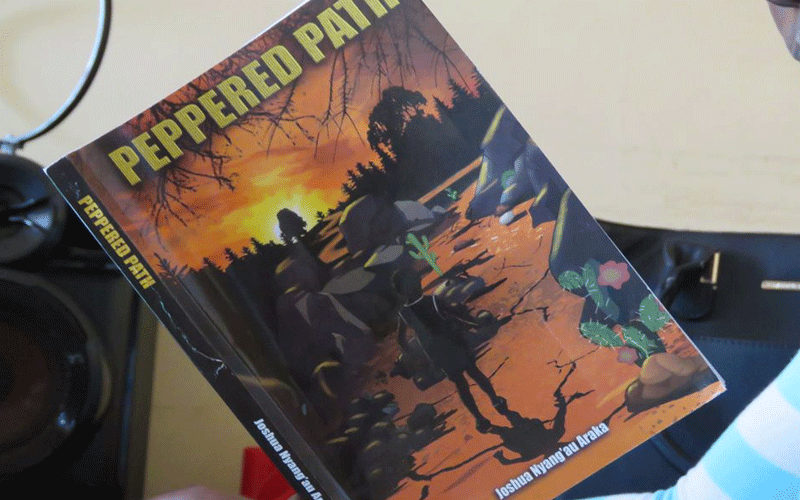Joshua turns to self-publishing after highlight on social media

Joshua Nyang’au Araka knew he could write way back in primary school.
He remembers one of his teachers marking his English Composition paper, and telling his mother how well her son had performed.
“According to my English teacher, the composition was so good that all the teachers gathered to determine how many marks they would award me.
I finally ended up getting a 35 out of the possible 40 marks,” Araka laughs.
The author of two books also cites his first day in secondary school when his teacher, who had given the fresh Form Ones a writing exercise, gathered the entire school at the assembly ground and read his piece.
“I couldn’t understand why it was read in the first place, and soon after the teacher requested me to step forward.
Thanks to that Composition, I became an instant celebrity, which would later lead me into being awarded prestigious positions such as prefect, class monitor and spiritual prefect.
We also formed a journalism club, through which I would address the entire school,” Araka says.
The eldest in his family mentions Facebook as an important tool in his writing journey.
With a tinge of pain in his tone, Araka recalls a time in college when he had entrusted his lecturer with a play he had written — only for the tutor to run off with the script.
Peppered start
“Although I had future plans to write books, that encounter made me doubt if I would ever get returns.
After months of posting my writing on Facebook, a friend challenged me to write a book. Taking up the challenge in 2018, I wrote my first book, Peppered Path,” he says.
The novel was ready for publishing by May 2018, but Araka couldn’t find a publisher.
Due to the high cost of self-publishing, he decided to save money. By December 2018, he had managed Sh300,000, which was enough to print the book.
“Were it not for my Facebook and WhatsApp friends coming together to help me with the money, it would have taken me longer to realise my target.

When I finished writing the book, I told them and they financially came in for me. The book was an instant hit among my readers and it has so far been read here in Kenya, Germany, England and America.”
Araka maintains that he had been writing the first book and the second one, a satire – Chronicles of the Idler – concurrently.
He wrote most of the second book on Facebook, posting pieces curated from topical issues on his timeline. Just like in college, somebody else vanished with a copy of the first book.
Scared, he preferred to publish Peppered Path first – even though the second one was already complete.
“After the first book came out, I didn’t struggle to find a publisher for the second one,” he says. He met a publisher called Matunda Nyanchama.
When I met Matunda during the 2013 elections campaign, he couldn’t believe that, despite covering the proceedings as a journalist, I was also a writer.
Soon after becoming Facebook friends, Matunda began discovering my talent. And because many people who read my satirical pieces compared me to the legendary Wahome Mutahi, Matunda, with his Nsemia Inc. publishers, picked the second book,” he says.
Araka admits writing as a family man isn’t easy at all, and despite all that, he has an interesting philosophy of navigating through.
“Time will never be an excuse for not writing because I wrote all the stories in The Chronicles on my phone in matatus and basically everywhere.
Then I would save in my email and later download in my computer and compile. The best writing time for me is around 2am. I usually wake up and write for one or two hours and then go back to sleep.
I usually do a chapter in two hours thanks for my fast typing speed and, expecially when whatever I am writing is coming directly from my head.
If you’re a writer, your spouse must be very understanding because inspiration can strike anytime.”
The father of three provides for his family through editorial and journalistic jobs.
“I have two daughters — Hezel, 10, and Blessing, Seven, and a four-year-old son Rowan, who looks like comedian Rowan Atkinson of the Mr Beans series. Hazel has read my book.
The beauty of my books is that the language and message are decent enough for anyone to read. That has been a plus for me because most of my customers have children.”
Nyangenkean philosophy
Araka studied at Laikipia University and the University of Missouri. In 2016, he won a photography award sponsored by the World Bank and in 2017, was the first runner-up of the Standard Gauge Railway Photography Competition.
“Journalism can, at times, make you lazy because you’re under instructions all day. But it’s still writing, and that gives you an upper hand.
The interactive nature of the career enabled me market my first book,” he adds. He usually walks around with copies of his books for sale.
Just four months after publishing, Araka recovered the Sh300,000 he spent on Peppered Path.
“As long as we say Kenyans don’t read, I think we should understand that books cost money and people have other priorities.
Because someone will tell you that they read your book and you wonder where they got the book from because you never sold to them.
There is no loss when you buy a book. The positive feedback excites me,” says the writer who autographs his book and posts photos with the buyers on social media.
“What improved the sales is that people loved it. Self-publishing has the limitation that you won’t stock in some bookshops and the courier delivery charges would put someone off.
But when people hear good stories about the book, they really don’t mind. A friend in Germany actually sent me money for the book and the courier services.”
Peppered Path and Chronicles of the Idler are all set in a small Nyamira county in a village called Nyagenke.
“My Twitter name is even @thenyagenkean. Being born and brought up in Nyagenke, I chose it to be a fictional setting for my writing.
Aspiring writers should simply write. Wanting to write is different from writing. And if you start writing, finish and then go publish.
A beginner might go for mainstream publishing – where a publisher would meets the publishing cost. But self-publishing is good because you control everything from the profits.
The legacy of a published book lives on. Even if I leave this world, my books will be here forever,” Araka explains.












